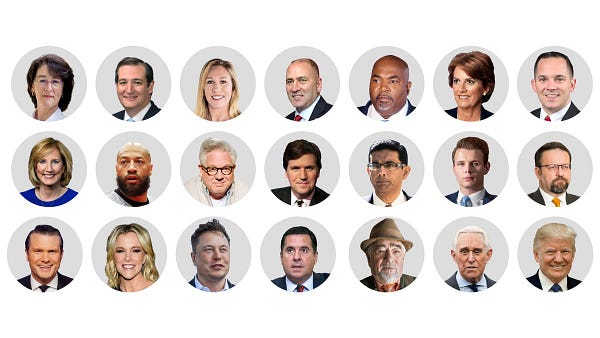Democracy is on the ballot.
It was nice that the Brazilian election occurred, Bolsonaro lost, and the current US president didn’t post false comments while the world waited to see if the incumbent would concede. There is cooperation with the transfer of power, at least.
In this regard, American elections do have global consequences.
Nearly two years of the Biden administration and it is difficult to remember that America used to have a right-wing demagogue as a president, who also utilized Twitter to divide people and communicate with staff.
Within the auspices of the Republican Party, a conservative cult of personality formed in Donald Trump’s image and, with that, it views democracy (and fairness) as inconvenient. Unfortunately, one of America’s two legacy political parties has been captured by a perceived need for vengeance. That vindictive sense stems from many GOP operatives’ need to gain the murky approval of the cult leader, who co-opted the conservative movement in 2016, and thus, the Republican Party.
In past midterm elections, people naturally vote against an unpopular president’s party and watch as a divided government gets very little done.
But this is not a normal cycle.
This is the cycle that began with the January 6th attack, which was fueled by many within the Republican Party.
January 6th, 2021
The overall trend for the Republican Party (in recent years) has been a downward slope of popularity. The unit appears to be deeply attached to cultural reactionaries and, just as deadly, moneyed interest invested in the destruction of our natural environment. These powerful shadow representatives range from gun lobbies to polluting industries, who fund GOP antics and divisiveness for favorable tax codes and little regulation. Republican incentive structures form from the donations of wealthy operators, whether they be megachurch leaders, major polluters, or resourceful ideologues.
The GOP is not invested in everyday individuals because it’s too tied to groups that do not exist in the general public.
The age of the Bumper Sticker.
It’s human to signify one’s favorite brands, places, music groups, and institutions. These are a part of people. But, in a period of mass advertising and fragmented markets (or audiences), that means an increase in superficial loyalties as a reaction to powerful tribes co-opting definitions, logos, and traditions for their in-group’s agenda. A tribe can be an identity and it can be a fan group. In a civic sense, the most powerful political tribes in America are the major parties and their funders.
In this Bumper Sticker Age, the Republican Party pushes messaging that suggests they are more moral, more family-oriented, better socialized, and more devout. Of course, there is much elitism (and bigotry) baked into this messaging scheme because of the history of exploitation, whether it be class-based, gender-oriented, racial, or any other device of unequally distributing social/economic power. But, the Trump years exposed how much of the GOP’s message was based on using people’s sense of superiority over (or fear of) others rather than being based on a political project calling for civic clarity in the form of less government interaction.
The inauthenticity within America’s preeminent post-Cold War political movement (and governing consensus) is forging coalitional changes in America’s current body politic with elections becoming the litmus test. But, for this process to play out as it has in the past, the Republican Party (and moderates) will have to lose the center-right bias that has guided American political dialogue and statecraft in the world after the Berlin Wall fell. Many in the Republican Party are turning against elections because they inherently understand this, even if it is just a superficial and careless acknowledgment that their policies are unpopular.
You don’t have to understand the importance of electoral coalitions in America’s civic culture to notice the GOP’s shrinking appeal.


Being American is accepting change.
It’s nice to know America was born in the fires of the Industrial Revolution.
The nation’s founding documents were introduced just before the Napoleonic Era roiled early modern Europe and the morbid memory of the American Civil War, still, fosters a growing commitment to equality, diversity, and human rights. All of this is to say that change is in the national bloodstream. The American nation ceases to be itself when the agents of regression and isolation overpower the historical forces that have made it exceptional and influential. Trumpism is deadly to historic progress because it attacks America’s real story, its diverse people, and the progressing democratic traditions that can be a shining light for the globe.
It is tragic to observe the defenestration of the Republican Party and the disingenuous transformations of many within it (some who were once viewed with glowing idealism). However, its failure to rebuff Donald Trump’s racist con job also says something about the modern political movement and tactics that guided this storied institution in recent decades.
Tuesday is important and Americans must vote for democracy.
In November 2022, that means punishing the party that indulges in well-financed schemes (like a fake news channel) to radicalize low-information-base voters, inflames a violent attack on a member of the opposite party’s spouse, pushes racist demagoguery, and engages in an ongoing coup attempt that is poisoning America’s democratic body politic.



There is danger ahead due to the fact that many Americans will most likely vote for this dysfunctional party and they will hold significant legislative/administrative power after Tuesday. The party will learn nothing from its former adventures in cheap reality show authoritarianism.







